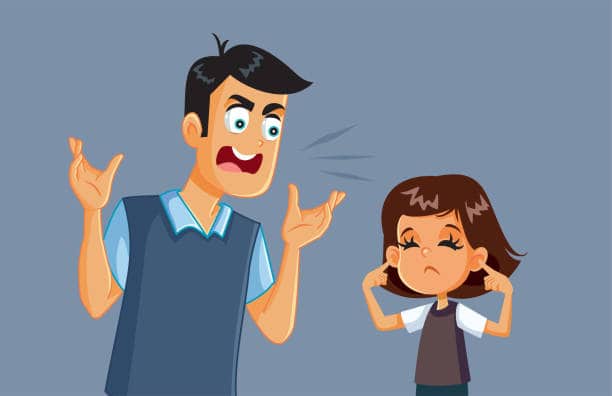When I was twenty-two years old, I wanted two things: 1. To be understood. 2. For people to think I was good at my job....Read more
As a mother, why would you possibly wonder why kids may be so loud? Because being with them is full of energy and excitement. So after kids play, they frequently express themselves loudly. They still need to prepare their social filters. So they will only sometimes realize when they are being too loud.
Also, kids are still gaining knowledge to communicate well. And sometimes, they improve their voices to get attention or specify their feelings. Also, their excitement and interest can cause them to be more fantastic voices. They explore and discover things around them.

Remember, being loud is just a part of their development and growth. As they mature and research extra about social standards. Children’s may become more aware of their quantity and adjust their behavior. In the transitional, persistence, and information can go a long way. While managing their lively personalities!
Why Is My Child Loud
Hey pal, it’s regular for your child to be loud. There are a few reasons why they are showing such exuberance. First of all, kids are active and enthusiastic. And they generally tend to specify themselves loudly . as they explore the sector around them.
At this level of improvement, their verbal exchange talents are nevertheless growing. They might raise their voice to get interested or bring their emotions. Remember, they may be learning how to express themselves correctly.
Also, your toddler is probably searching for interest or asserting independence. Being loud can make them feel noticed and recounted by others, specifically if they’re trying to be heard in busy or crowded surroundings.
Additionally, their environment can play a role in their quantity degree if they may be around other active kids or in stimulating surroundings. They might shape that power with their loudness.
As determined, it’s essential to guide them lightly towards appropriate approaches. of expressing themselves and training. They are about social norms, and while it’s fair to lower their extent with patience, knowledge, and tremendous reinforcement. They’ll discover ways to find stability. And broaden better manipulation of their voice as they develop. Remember, each infant is specific, and their loudness is just a part of their adventure. as they find out their individuality!
Medical reasons for talking loud?
Hey there, as a chum, I apprehend your subject approximately a person talking loud. There could be diverse clinical motives for this behavior. Here are a few possibilities:
- Hearing Impairment: If a person has hearing difficulties. They may no longer understand how loudly they are speaking. They might improve their voice to compensate for their hearing loss. As they’re unaware of the volume they’re using.
- Speech Disorders. Certain speech disorders or situations like stuttering and apraxia. Or dysarthria can reason people to speak loudly. as they try to overcome their speech challenges.
- Neurological Conditions. Some neurological conditions. Such as Parkinson’s disorder, stroke, or demanding brain accidents. It can affect someone’s management over their vocal volume, leading them to talk louder than meant.
- Psychological Factors. Emotional or psychological factors like tension and stress. Or excitement also can influence someone’s voice. When emotions are heightened, human beings may unconsciously talk louder.
- Medication Side Effects. Certain medications. Can purpose changes in voice extent as an aspect impact? They are Making individuals communicate louder than usual.
Suppose you observe someone talking loud continuously. It is helpful to encourage gently. They, too, are trying to find clinical advice or assessment from a healthcare expert and identifying and addressing the underlying scientific.
The reason could make a large difference in helping them alter. Their voice extends correctly. Just remember, drawing close. The subject with kindness and expertise is vital to support. Them via any capability challenges they might be facing.
At what age do kids stop being loud?
Hey buddy, it’s a commonplace query, but there isn’t a specific age. At the same time, all children prevent being loud, given that each toddler is one-of-a-kind. , as they develop and increase, their extent of management generally improves.
Around the age of two to 4, children begin. to broaden higher conversation capabilities and social cognizance. This may also result in lower random loud outbursts as they learn to specify themselves extra correctly and recognize social cues.
As they input faculty age, around five to 7 years old. Kids frequently become greater privy to suitable conduct in one-of-a-kind settings. They start to apprehend the concept of inside voices and modify their volume thus, particularly in school or public locations.
By adolescence, commonly between a while 10 to 14. children have a better draw close to social norms and peer stress. That could influence their conduct. They become extra conscious of how their moves affect others and are more likely to mild their extent.
Keep in mind individual personalities and temperaments. And environments play a good-sized function in how speedy an infant learns to govern their extent. Some children may additionally be extra reserved. Others may maintain their vitality. And loudness at some stage in their lives.
Remember, patience and mild steerage are critical as they expand and develop. Emphasize respecting others’ private space and being conscious of their volume in exceptional conditions. With time and nurturing, they’ll locate their balance between expressing themselves and being considerate of those around them!
How do I teach my child to speak quietly
Hey there, teaching your toddler to talk quietly is a gradual system. that requires endurance and expertise. Here are some friendly pointers to help you with that:
- Lead by Example. Children frequently mimic the conduct of their parents or caregivers. Model talking quietly and frivolously in numerous situations. So that they see how it is completed.
- Use Positive Reinforcement. Praise your baby once. They speak quietly or use their interior voice. Positive reinforcement can encourage them to keep the conduct.
- Explain the Concept. Talk about your baby approximately. The importance of whispering in favorable settings. Like libraries, restaurants, or when a person is resting. Help them recognize why it is vital to be considerate of others.
- Practice Inside Voice. Encourage your child to exercise their “internal voice” at home. Play games where they need to speak quietly, like whispering secrets or role-playing eventualities.
- Create Quiet Zones. Designate positive areas in your home where. They should use their inside voice, like bedrooms or reading corners.
- Provide Gentle Reminders. When your toddler receives too loud. Provide them gentle reminders to use their inside voice without scolding them.
- Engage in Listening Activities. Play games that contain listening carefully. Like “Simon Says” or “Guess the Sound,” to help them expand their experience of extent management.
- Teach Relaxation Techniques. Show your child calming techniques. Together with deep breathing or counting to ten. to assist them in managing their pleasure and feelings.
- Be Patient. Changing behavior takes time. So be an affected person with your toddler as they examine to talk more quietly. Encourage their efforts, although it’s now not best proper away.
Why does my child shout when he talks?
Hey pal, curiosity about why your infant shouts while speaking is understandable. There may be numerous motives for this conduct. And it’s important to discover them with patience and knowledge. Here are some possible explanations:
- Excitement and Enthusiasm. Young kids often get excited. Expressing themselves or telling a tale. Leading them to elevate their voice without knowing it.
- Attention-Seeking. Shouting may be a manner for youngsters. to get attention or be heard, especially in a hectic family. Or while surrounded with the aid of different talkative people.
- Communication Difficulties. If your toddler has speech or language-demanding situations. They might shout to compensate for difficulties articulating their thoughts or being understood.
- Hearing Impairment. Sometimes, children with listening problems may not recognize it. They may be speaking loudly because they can’t pay attention to themselves.
- Emotional Expression. Strong emotions like anger, frustration. Or pleasure can lead youngsters to elevate. Their voices as they are trying to convey their feelings.
- Imitating Others. Children often mimic the behavior they take look at around them. They may start doing the same if someone else is shouting or talking loudly.
- Developmental Stage. Younger children, in particular. are still studying social norms and appropriate communique volumes. And shouting may be part of their studying system.
To assist your infant with this behavior. Try lightly talking to them about using their inside voice in appropriate settings. Please encourage them to express themselves evenly and teach them about volume control. Be supportive and affect people as they learn to alter their speaking behavior.
Can shouting damage a child?
Hey pal, yes, shouting could have poor results on a toddler. Both emotionally and psychologically. While occasional loud verbal exchange might also appear in moments of high feelings. Frequent or extreme shouting can be adverse. Here are some ways it can affect a toddler:
- Emotional Impact. Shouting can motivate worry, tension, and stress in a child. They might feel unsafe or insecure once they witness angry or loud outbursts.
- Low Self-Esteem. Children who are regularly shouted at may broaden low shallowness. and a terrible self-photo, feeling like they’re now not worthy of respect or love.
- Behavioral Issues. Some youngsters may additionally internalize. The shouting and grow to be withdrawn. At the same time, others may additionally externalize their feelings, mainly through aggressive or defiant conduct.
- Communication Problems. Constant shouting can prevent powerful communication. The kid and the discerning can create barriers and a loss of trust.
- Mental Health Impact. Long-time period publicity to yelling can contribute. To intellectual fitness problems like despair or anxiety in a few kids.
- Learning and Cognitive Development. A careworn and traumatic environment can affect a baby’s ability to concentrate, examine, and process facts efficiently.
As a pal, I encourage you to find healthier ways to communicate with your child practice using a calm tone, active listening, and effective reinforcement. When conflicts arise, try to talk about problems frivolously and find positive answers together. Remember, open verbal exchange, staying power. And understanding can create a supportive environment where your toddler feels secure, cherished, and valued.
Why do kids not listen until you yell?

Hey friend, it cannot be enjoyable for youngsters. Only appear to listen once you enhance your voice. So, there are reasons behind this behavior. Let’s explore a few possible reasons:
- Attention Span. Kids can get by without problems. Absorbed in their global activities. And it could take some effort to seize their interest completely. Sometimes, raising your voice might be the simplest way to interrupt. Their attention and get them to pay interest.
- Habituation. When parents frequently repeat instructions without immediate consequences. Children may get conversant in responding after. They feel an experience of urgency. Along with a raised voice, they are showing seriousness.
- Lack of Understanding. Children may need to recognize the importance. Or the urgency of positive instructions. When you enhance your voice, they might interpret. It’s a sign that the problem is extreme and requires their attention.
- Testing Boundaries. Some kids test limitations and try to see how great a deal it is. They can get away with it before dealing with the effects. Raising your voice could signal that. They’ve reached the restriction and need to comply.
- Emotional Expression. As feelings strengthen, parents might resort to yelling in a manner. To vent their frustration or stress. Inadvertently the use of it as a method to get their toddler’s attention.
- Attention-Seeking. If children understand that, they get hold of more attention. When mother and father yell, they may subconsciously hold positive behaviors to elicit a response.
As a chum, I’d endorse exploring alternative conversation techniques. Try to maintain a calm and assertive tone while giving instructions. Be clear and consistent with your expectations. provide superb reinforcement after they listen without yelling. Also, be patient and informed, as changing conduct may take time.
More Related Articles For Parents Guide:
- Can Kids Eat Beer Battered Fish
- At What Age Can Babies Eat Fried Eggs
- Why Do kids Wear Hoodies In The Summer
- Are Happy Meals Good for Kids
- Are Kids Allowed In Dave & Buster
- Can Short Parents Have Tall Kids
- Do 7 Year Old Kids Still Play With Toys

When I was twenty-two years old, I wanted two things: 1. To be understood. 2. For people to think I was good at my job. As a first time founder, I remember feeling under-qualified. I felt like an impostor—and it showed. I struggled to communicate my value in a way that my colleagues and potential investors could understand. I realized I needed to clarify my message and use social media as a tool to help me build my personal brand. This would help me look more credible, I thought. So I got to work. I updated my social media profiles, built a personal website, and began sharing my story online. The more content I shared, the more confident I became. And the more confident I became, the more credible I appeared. Now i am writing blogs for madeforkids.co.uk on different topics on kids.
- Latest Posts by Anna Vatuone
-
What Are The Uses Of A Drone
- -
What Are The Uses Of Playhouse
- -
How To Get A Child To Warm Up To You
- All Posts
